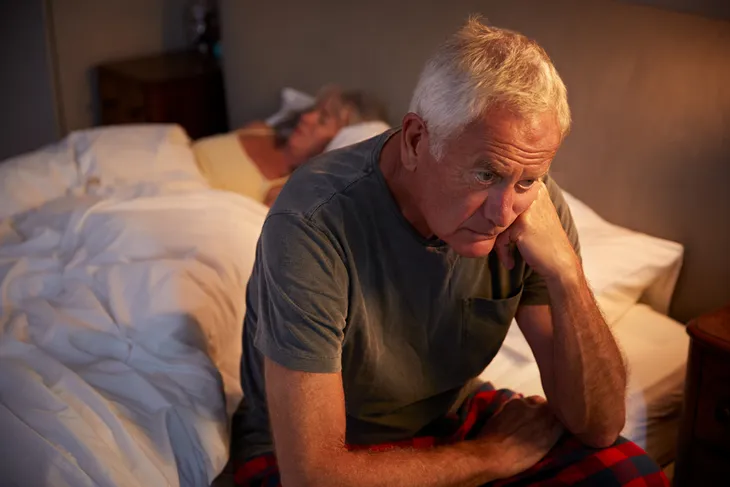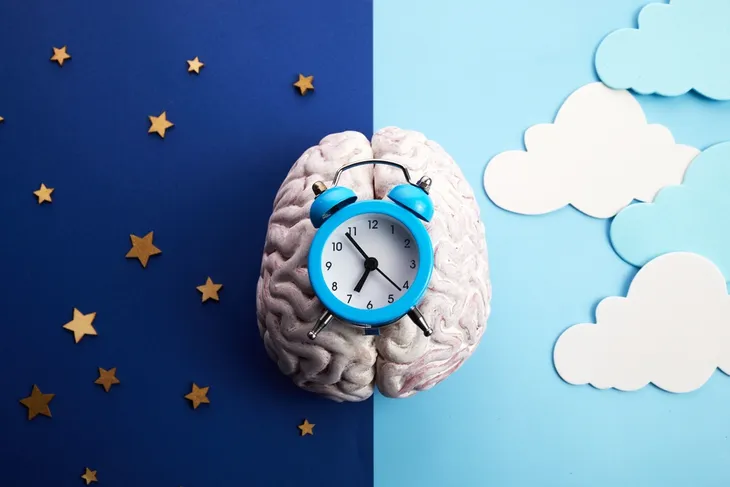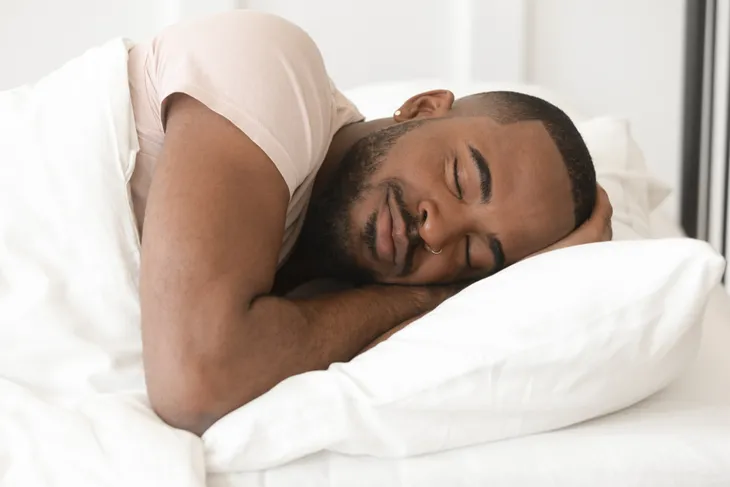- People with non-24-hour sleep-wake disorder fail to synchronize to a 24-hour day.
- A shifting rhythm can have consequences on your body, such as fluctuations in your mood, alertness, and appetite.
- While there is no cure, there are treatment strategies that can help you maintain a regular sleep-wake cycle and in turn, decrease symptoms.
Most people go to bed and wake up roughly around the same time every day. While some nights may be harder to fall asleep than others, usually you become naturally sleepy due to your body’s internal clock. Your internal clock is also synchronized to a 24-hour cycle (known as the circadian rhythm) but people with non-24-hour sleep-wake disorder fail to synchronize to this process.
A shifting rhythm can take a serious toll on your body and health so it’s important to follow your treatment plan. But there’s a lot more to know about this disorder. Follow along as we find out what non-24-hour sleep-wake disorder is plus the common signs, causes, and treatment options.
What Is Non-24-Hour Sleep-Wake Disorder?
There are many systems and processes that help the human body function but one impressive process we have is an internal body clock that follows a 24-hour cycle known as the circadian rhythm. This process is responsible for regulating your sleep-wake cycle to help you fall asleep and wake up (roughly) at the same time each day. But people with non-24-hour sleep-wake disorder fail to synchronize to a 24-hour day.
Non-24-hour sleep-wake disorder is a circadian rhythm sleep disorder. The National Organization for Rare Disorders (NORD) explains, “Instead of sleeping at roughly the same time every day, someone with N24 will typically find their sleep time gradually delaying by minutes to hours every day. ” Over time, their sleep periods will go all around the clock. This means one night you may fall asleep at 10 p.m. and as the days go on your bedtime will slowly get later and later, moving around the clock, and eventually, you’ll be falling asleep during the middle of the day.
Complications of Non-24-Hour Sleep-Wake Disorder
A shifting rhythm can have consequences on your body. For starters, the Sleep Foundation says an unsynchronized rhythm can cause “inappropriate fluctuations in your mood, appetite, and alertness.” Once your internal clock is unsynchronized, you may prefer sleeping during the middle of the day and find it hard to sleep at night.
These odd sleep cycles can also interfere with your daily life. You may have difficulty performing at work or school or keeping up with social commitments. The source also notes some people may develop depression from the stress of not keeping a normal schedule or the side effect of not getting enough sunlight.
Common Signs of Non-24-Hour Sleep-Wake Disorder
According to NORD, the first sign of non-24-hour sleep-wake disorder is periodic insomnia at night and excessive daytime sleepiness. If your sleeping problems are interfering with your daily life then this is another key sign you may be battling the disorder.
Since the disorder moves around the clock, it’s also possible to feel normal when your body is once again synchronized with a normal rhythm. But once the body is unsynchronized from the normal day-night cycle, symptoms will return.
What Causes Non-24-Hour Sleep-Wake Disorder?
Non-24-hour sleep-wake disorder occurs when the body’s internal clock isn’t synched with the light and dark cycles of day and night. So, what can cause the cycle to become unsynchronized?
The Sleep Foundation says that the disorder is most common in people who are totally blind due to a lack of light reaching their internal clock. In fact, the source notes that roughly 50-percent of completely blind individuals develop the disorder. But not all blind people will develop it because some individuals “retain the ability to perceive light to a certain extent.”
Can Non-24-Hour Sleep-Wake Disorder Occur in Sighted People?
While non-24-hour sleep-wake disorder is more common in people who are totally blind, it can also occur in sighted people. However, the Sleep Foundation notes that in this case, it’s often misdiagnosed as another sleep disorder.
While it’s still unclear what causes the disorder in sighted people there are some theories. First, the source notes that a large study found that the disorder was more common in males, and symptoms typically started in their teens or early 20s. The source also says the following may be possible risk factors:
- Having a genetic predisposition.
- A weak circadian clock due to years of staying up late and getting too much exposure to light at night.
- Having a mental health disorder (such as depression, bipolar, OCD, schizophrenia).
- Experiencing a traumatic brain injury.
How Is Non-24-Hour Sleep-Wake Disorder Diagnosed?
If you think you’re suffering from a non-24-hour sleep-wake disorder, contact your doctor. WebMD says that sometimes it can be mistaken for sleep deprivation or another sleep disorder or a result of psychiatric problems. So it’s important to see a health professional for a proper diagnosis and don’t be afraid to get a second opinion.
To diagnose the disorder, your doctor will start by reviewing your medical history and current symptoms, as well as performing a physical examination. It’s important to provide your doctor with as much information as possible. So, do your best to keep a journal to track your sleep patterns and any symptoms you experience.
The Sleep Foundation says one way a doctor can track your sleep habits is with actigraphy. Actigraphic devices can be worn on the wrist and track your sleep and wakefulness to provide insight into your sleep-wake cycle. Your doctor may also request polysomnography (an overnight sleep study). A sleep study can’t detect your habits over time but it can be a useful tool in ruling out other sleep disorders.
How Is Non-24-Hour Sleep-Wake Disorder Treated?
Unfortunately, there is no cure for non-24-hour sleep-wake disorder — it’s a lifelong condition. That said, there are treatment strategies available that can help manage the condition.
The disorder is typically treated with prescription medication, supplements, and light therapy. Which treatment or combination of treatments is best for you will be up to your medical team so be sure to follow the guidance of your doctor.
It’s also worth noting, the Sleep Foundation says you’ll need to follow your treatment plan for the rest of your life because the internal body clock generally becomes unsynchronized again if you stop therapy. Let’s take a closer look at some of these treatment options next.
The Role of Melatonin
Your brain produces a hormone called melatonin in response to darkness, explains the National Center for Complementary and Integrative Health. When you’re exposed to less light in the evening, the brain produces the hormone to help you feel sleepy. Essentially it helps regulate your circadian rhythm. But NORD points out that some people with non-24-hour sleep-wake disorder produce less melatonin than normal.
With this in mind, your doctor may recommend melatonin supplementation as a part of the treatment. They may recommend an over-the-counter supplement or a prescription. But it’s very important to follow the guidance of your doctor and never try to self-medicate.
How Light Therapy Can Help
Another treatment strategy for non-24-hour sleep-wake disorder is light therapy, also known as phototherapy. During light therapy, you’re exposed to bright light, typically early in the morning, says WebMD. The bright light is emitted from a lightbox that mimics natural sunlight. The source says late in the day you’ll wear special goggles to avoid light. The goal is to send the right signals to your brain about light and dark.
It’s worth noting, light therapy only works for sighted people and blind people with functioning light pathways. The source also says it’s usually only recommended after your sleep hours are back to normal and used to help regulate your sleep schedule.
Other Ways to Manage the Disorder
Along with your medical treatment plan, your doctor may also recommend lifestyle changes. The Sleep Foundation says one possible adjustment is setting sleep hygiene rules. This can include limiting naps, avoiding screens before bed, and getting regular exercise.
The source also notes that you may need to “adapt your meals, exercise, light exposure, bedtimes, socializing, and other activities to your desired schedule in order to strengthen circadian cues and avoid triggering a relapse.”
Keep in mind, according to the terms of the Americans with Disabilities Act (ADA), non-24 qualifies as a disability. According to the terms, most workplaces are legally obligated to make reasonable accommodations for you, such as a flexible work schedule. WebMD says students with the disorder should consider taking classes online and asking teachers for a lighter course load or flexible exam schedule.
What Is the Outlook?
Even though this is a disorder you’ll have to manage for the rest of your life, the Sleep Foundation says the general outlook is good as long as you stick to your treatment plan. Consistent adherence can help maintain a regular sleep-wake schedule and improve excessive daytime sleepiness and nighttime insomnia.
The source says unfortunately, many people stop following their treatment plan because it requires “adherence to a rigid schedule.” But if you want to maintain a regular circadian rhythm, then lifelong treatment is necessary.
It’s also worth noting that some people still experience difficulty concentrating, tiredness, and fragmented sleep, even after achieving a regular sleep-wake schedule. But this may indicate that another bodily process is unsynchronized. If you’re still experiencing symptoms it’s important to address them with your doctor. They may need to adjust your treatment plan.
Get Support
As mentioned, non-24-hour sleep-wake disorder is a lifelong condition so it’s important to lean on a support system. Ask your doctor for support groups in your area or search online. Connecting with people who are going through something similar can help you feel less alone. Support groups can also offer additional resources to help you and your family cope.
It’s also important for your friends and family to get informed on the topic too. Having a better understanding of what the disorder is and what you’re growing through can help them support you.















